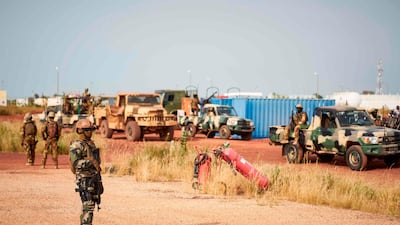ISIS has claimed an attack in Mali's volatile east nera the border with Niger that killed a French soldier on Saturday, a day after 53 Malian troops were massacred in the same area.
Militants "detonated an explosive device on a French army convoy in the Indelimane area", ISIS said on its Telegram channel.
The recent wave of attacks has underscored the fragility of a region straddling several countries under increasing pressure from extremist violence.
It also comes just days after the US killed ISIS leader Abu Bakr Al Baghdadi in a raid in Syria. The group has subsequently named a new head, Abu Ibrahim Al Hashimi Al Qurayshi and various ISIS affiliate have begun to pledge loyalty. The move shows the enduring threat of ISIS and its local affiliates even after the destruction of their self-declared caliphate in March this year.
Cpl Ronan Pointeau, 24, died after an armoured vehicle in which he was travelling hit an improvised explosive device near the city of Menaka.
Pointeau and his colleagues were escorting a convoy between the cities of Gao and Menaka.
It had "no link" to Friday's devastating strike on Malian soldiers, also in the Menaka region, French military spokesman Col Frederic Barbry said.
"This insidious attack shows the importance and bitterness of the fight against armed terrorist groups" in the border region straddling Mali, Niger and Burkina Faso, the French defence ministry said.

Armed Forces Minister Florence Parly said she would be "visiting Mali very soon to hold discussions with Malian authorities".
French President Emmanuel Macron paid tribute to Pointeau and expressed solidarity with the French and African troops fighting in the region.
Friday's strike at a military outpost at Indelimane, also in the Menaka region, killed 49 soldiers, wounded three and left 20 survivors, the Malian Armed Forces said on Saturday.
ISIS claimed responsibility for the attack, the group's Amaq news agency reported on Saturday.
An army officer said troops arrived at the outpost at about 5.00pm on Friday and "took back control of our positions.
"The terrorists carried out a surprise attack at lunchtime. Army vehicles were destroyed, others taken away."
The attacks came a month after two militant assaults killed 40 soldiers near the border with Burkina Faso. Several sources said the real death toll was higher.
Minusma, the UN mission in Mali, condemned the raid and said its peacekeepers were helping Malian troops secure the region.
"This bloodshed that Mali has been living through cannot go on," said Mahamound Dicko, an influential religious leader in Mali.
"Do you want us to resign ourselves to this suffering? We can resist."
Rights activist Alioune Tine, from Mali's western neighbour Senegal, called for action across Africa to tackle the threat.
"If Africa does not mobilise for Mali and Burkina, it won't be spared the bushfire that is quickly catching West Africa's coastal countries, the next chosen targets" of the extremists.
The violence has also spilt over into Burkina Faso and Niger where extremists have exploited existing inter-communal strife, leaving hundreds dead.
In Mali, the attacks have spread from the arid north to its centre, an ethnically mixed and tense region.
The recent assaults are a humiliation for the so-called G5 Sahel force – a much-trumpeted initiative under which five countries created a joint 5,000-man anti-terror force – and for former colonial ruler France, which is helping to bring security to the fragile region.
Northern Mali came under the control of Al Qaeda-linked extremists after Mali's army failed to quash a rebellion there in 2012.
A French-led military campaign was launched against the militants, pushing them back a year later.
But the extremists have regrouped and widened their hit-and-run raids and landmine attacks to central and southern Mali.

